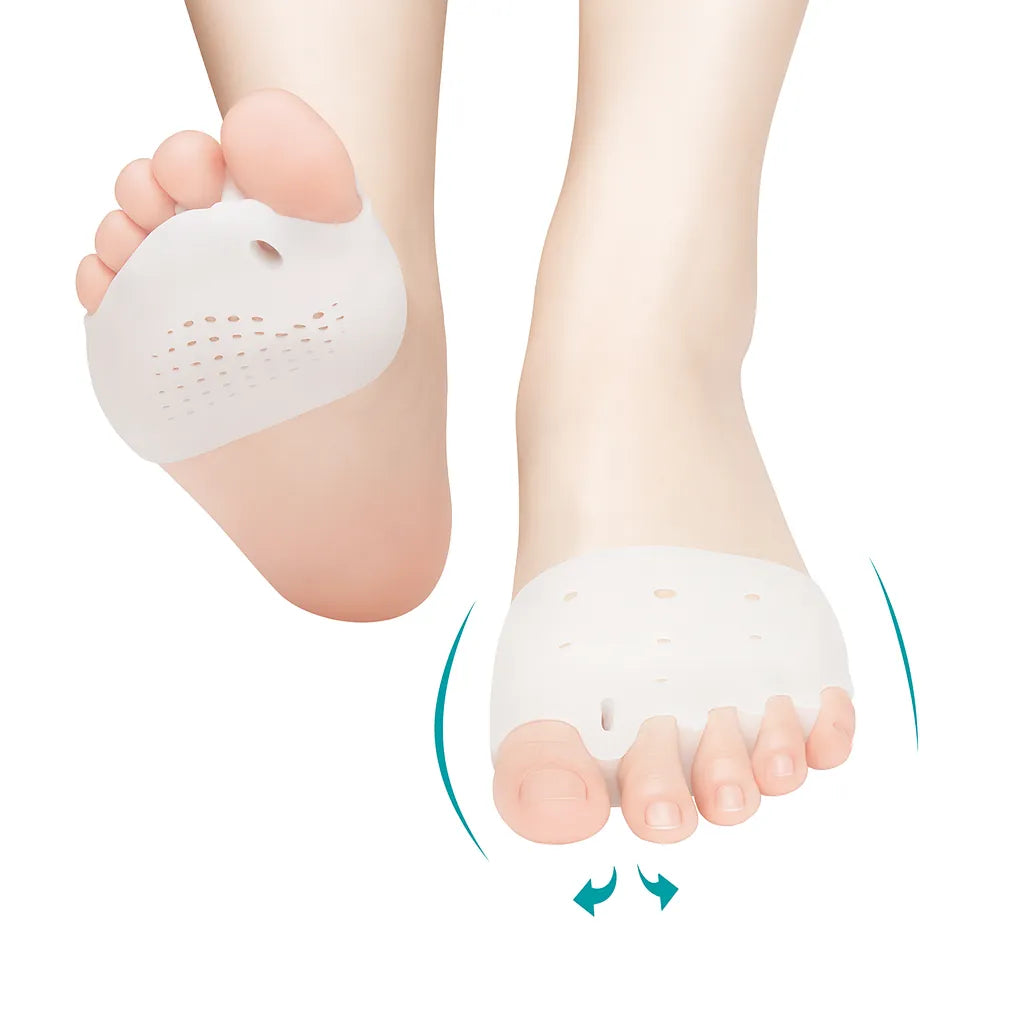
When To Seek Medical Help For Foot Pain
Share
Did you know that approximately 75% of people will experience foot problems at some point in their lives? Foot pain can range from mild discomfort to severe agony, affecting our ability to walk, exercise, and enjoy daily activities. Knowing when to seek medical help for foot pain is crucial for proper diagnosis and treatment. Ignoring foot pain can lead to worsening conditions and long-term complications. Whether it's Achilles tendonitis, hammer toe, or even a simple sore on your big toe, don't let foot problems hold you back. So, if you're tired of suffering in silence with your foot problems, read on to find out when it's time to take action.
Common Causes of Foot Pain and Preventive Measures
Foot pain can be a real pain in the...well, foot. There are ways to prevent it and keep those tootsies happy. Let's dive into some common causes of foot pain and how you can take preventive measures to avoid them.
Various Factors Can Cause Foot Pain
Foot pain can stem from a variety of factors, including injuries, overuse, or underlying medical conditions. It's important to understand these causes so you can take action early on. Some common foot conditions that may cause pain include:
- Plantar fasciitis: This occurs when the tissue connecting your heel bone to your toes becomes inflamed.
- Bunions: These pesky bumps form at the base of your big toe and can cause discomfort.
- Morton's neuroma: This condition involves thickening of the tissue around a nerve leading to your toes.
- Gout: A type of arthritis that causes sudden and severe joint pain, often affecting the big toe.
Preventive Measures for Happy Feet
Prevention is key. By taking some simple steps, you can reduce the risk of experiencing those achy feet blues. Here are some preventive measures you should consider:
- Wear proper footwear: Make sure your shoes fit well and provide adequate support for your feet.
- Practice good foot hygiene: Keep those puppies clean and dry to prevent infections or fungal growth.
- Avoid overuse and high impact activities: Give your feet a break by alternating between different types of exercises or activities.
- Maintain a healthy weight: Excess weight puts added pressure on your feet, so strive for a healthy BMI.
By understanding the common causes of foot pain and implementing these preventive measures, you'll be well on your way to keeping those feet happy and healthy!
Impact of Foot Pain on the Body
Foot pain can have a significant impact on various aspects of our bodies, including mobility, balance, and overall quality of life. When we experience foot pain, it can affect how we walk or stand, leading to changes in our gait or posture. These alterations in movement patterns can place additional strain on other parts of the body.
Chronic foot pain, such as that caused by conditions like flat feet or heel bone spurs, can result in long-term consequences. The bones, muscles, and skin in our feet work together to support our weight and facilitate movement. When any part of this intricate system is compromised due to pain or injury, it can disrupt the overall functioning of the body.

One way foot pain impacts the body is through changes in gait. For example, if you develop a limp due to foot discomfort, you may inadvertently put more pressure on your knees or hips while walking. Over time, this uneven distribution of weight can lead to joint problems and contribute to issues such as knee osteoarthritis.
When we experience foot pain, we may try to compensate by shifting our weight onto other areas of the feet. This compensation mechanism can cause overuse injuries in those areas and result in further discomfort.
Recognizing the impact of foot pain on the body emphasizes the importance of seeking appropriate medical attention when necessary. By addressing foot pain promptly and effectively with professional guidance from a healthcare provider specializing in podiatry or orthopedics, you can prevent potential complications and maintain your overall well-being.
Signs and Symptoms Requiring Immediate Medical Attention
If you're experiencing foot pain, it's essential to know when to seek medical help. Some signs and symptoms warrant immediate attention to ensure prompt intervention for potentially serious conditions. Here are the key indicators that should not be ignored:
Severe swelling, inability to bear weight, or open wounds
If your foot is severely swollen, you can't put any weight on it without excruciating pain, or you have open wounds on your foot, it's crucial to seek immediate medical attention. These symptoms may indicate a severe injury or fracture that requires professional evaluation and treatment.
Persistent numbness or tingling sensations
Don't dismiss persistent numbness or tingling sensations in your foot as they could be a sign of nerve damage. Nerve damage can result from various causes such as diabetes, injuries, or compressed nerves. Seeking urgent evaluation is vital to prevent further complications and address the underlying issue.
Unusual redness, heat, or signs of infection
If you notice unusual redness and warmth in your foot along with signs of infection like pus or foul odor, it's important to consult a healthcare professional promptly. These symptoms may indicate an infection that needs immediate treatment with antibiotics to prevent its spread and potential complications.
By recognizing these signs that require immediate medical attention for foot pain, you can take proactive steps towards getting the care you need. Remember that seeking timely help can make a significant difference in managing your condition effectively.
Emergency Situations and Urgent Care for Foot Injuries
Some situations require immediate medical attention. Fractures, dislocations, or deep lacerations are considered emergencies that should be addressed right away.
In such cases, it is crucial to seek professional care promptly. Emergency rooms are equipped to handle these types of injuries and provide the necessary treatment. They have the expertise and resources to assess the severity of the injury and take appropriate action.

However, not all foot injuries require a trip to the emergency room. Urgent care facilities that specialize in acute foot injuries can also provide timely care when regular appointments are not available or feasible.
Urgent care centers cater specifically to urgent foot injuries that cannot wait for an appointment with a specialist or primary care physician. These facilities have sports medicine specialists who understand the unique needs of athletes and individuals with overuse injuries.
Understanding where to seek emergency or urgent care for foot injuries is essential for ensuring timely treatment. Here's a breakdown of when to consider each option:
Emergency Room:
- Fractures
- Dislocations
- Deep lacerations
- Severe swelling and bruising
Urgent Care:
- Sprains and strains
- Minor fractures (e.g., toe fractures)
- Ingrown toenails
- Calluses and corns
- Overuse injuries
Remember, if you're unsure about whether your foot injury requires immediate medical attention, it's always best to err on the side of caution and consult with a healthcare professional.
Diabetic Foot Pain: Knowing When to Seek Medical Advice
If you have diabetes and are experiencing foot pain, it's crucial to know when to seek medical advice. Ignoring or dismissing foot pain can lead to severe complications down the line.
Prompt Medical Attention for New or Worsening Foot Pain
Individuals with diabetes should promptly seek medical advice if they experience any new or worsening foot pain. Even seemingly minor discomfort can be a sign of underlying issues that require immediate attention.
Indications of Complications: Neuropathy and Poor Circulation
Diabetic foot pain can often be an indication of complications such as neuropathy or poor circulation. Neuropathy is a condition where nerve damage causes numbness, tingling, or burning sensations in the feet. Poor circulation, on the other hand, hinders blood flow to the feet, leading to slow healing and increased risk of infection.
Managing Diabetic Foot Pain Effectively
Understanding the specific concerns related to diabetic foot pain is essential for effectively managing the condition. Here are some key points to consider:
- Regularly inspect your feet for any signs of redness, swelling, cuts, or sores.
- Keep your blood sugar levels under control through proper diet and medication.
- Wear comfortable shoes that provide adequate support and cushioning.
- Avoid walking barefoot and protect your feet from extreme temperatures.
- Practice good foot hygiene by washing them daily with warm water and mild soap.
Remember that prevention is always better than cure. By seeking medical advice at the earliest sign of discomfort, you can prevent further complications and ensure proper management of your condition.
Taking Action for Foot Pain Relief
Now that you have a better understanding of the common causes and preventive measures for foot pain, as well as the signs and symptoms that require immediate medical attention, it's time to take action. Remember, your feet are the foundation of your body, and neglecting foot pain can have a ripple effect on your overall well-being. So what can you do to find relief?
First and foremost, listen to your body. If you're experiencing persistent or worsening foot pain, don't hesitate to seek medical help. Whether it's scheduling an appointment with your primary care physician or consulting a podiatrist, taking proactive steps towards addressing your foot pain is crucial. Remember, early intervention can prevent further complications down the line.
In addition to seeking professional help, make sure to prioritize self-care for your feet. This includes wearing supportive shoes that fit properly, practicing good hygiene by keeping your feet clean and dry, and engaging in exercises that strengthen the muscles in your feet. By incorporating these habits into your daily routine, you can provide long-term relief for foot pain.
FAQs
How do I know if my foot pain requires medical attention?
If you're unsure whether your foot pain warrants medical attention, there are a few key indicators to consider. If you experience severe pain that limits your mobility or persists for an extended period of time despite rest and home remedies, it's best to consult a healthcare professional.
Can I treat foot pain at home?
While some cases of mild foot pain can be managed at home with rest, ice packs, elevation (RICE), and over-the-counter pain medications like ibuprofen or acetaminophen; it's important not to ignore persistent or worsening symptoms. Seeking medical advice will ensure proper diagnosis and appropriate treatment.
Are there any natural remedies for relieving foot pain?
There are several natural remedies that may help alleviate foot pain, such as soaking your feet in warm water with Epsom salt, applying essential oils like lavender or peppermint, or using orthotic inserts for added support. However, it's crucial to remember that these remedies may provide temporary relief and should not replace professional medical advice.
Can foot pain be prevented?
While some causes of foot pain are unavoidable, there are preventive measures you can take to reduce the risk. These include wearing comfortable and supportive footwear, maintaining a healthy weight to minimize stress on your feet, and practicing proper foot hygiene.
When should I consider seeing a podiatrist?
If you're experiencing chronic foot pain, have a pre-existing condition like diabetes or arthritis that affects your feet, or if your symptoms significantly impact your daily activities and quality of life, it's wise to consult a podiatrist who specializes in diagnosing and treating foot disorders.
Author Bio

Marlene Carvalho
Certified Sports Physiotherapist of Elite and Olympic athletes; Performance Coach to racing drivers
Marlene Carvalho is a sports physiotherapist passionate about all things sports.













